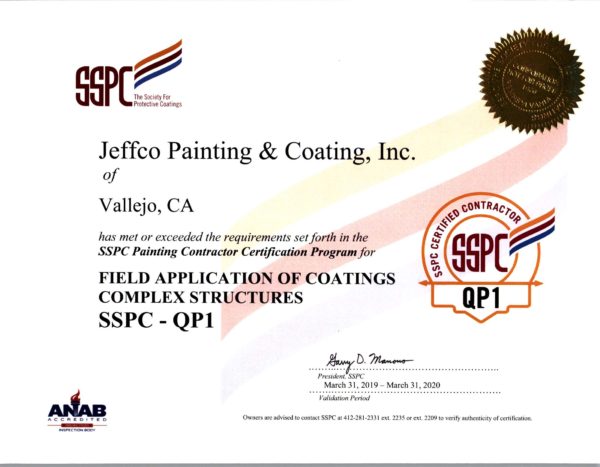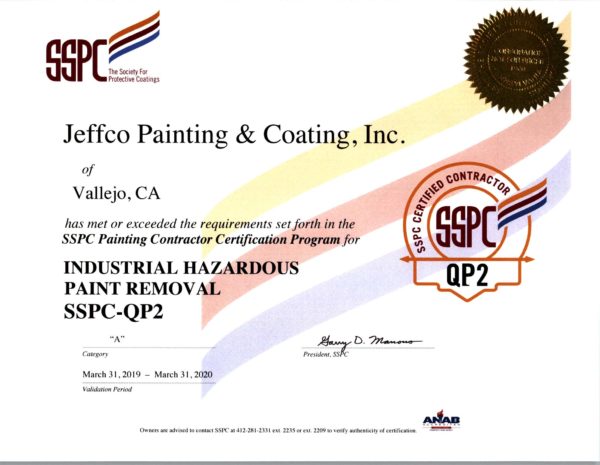Certifications
Jeffco Painting and Coating’s goal is to provide its customers with the best quality service and product available.
In order to do that we joined with SSPC and NACE to train our employees to a very high standard, and develop procedures and processes that will result in a higher quality product than other coating companies. The following are some of the certificates that we have proudly achieved.
SSPC QP 1
SSPC QP1 certification is a nationally recognized program that evaluates the practices of industrial painting contractors in key areas of business. These standards are considered to be the MINIMUM level of service and quality for today’s coatings industry. The complex nature of coating systems and the specific surface preparations required for these systems, have made the QP1 guidelines vital to the longevity of applied protective coatings. The program is designed to provide facility owners and specification writers a means to determine whether the painting contractor has the capability to perform surface preparations and coating application in the field on complex industrial and marine structures, such as:
- Bridges
- Food and beverage facilities
- Off-shore drilling
- Power generation facilities
- Petro/chemical plants
- Storage tanks
- Ships maintenance
- Waste water treatment facilities
SSPC developed the Painting Contractor Certification Program (PCCP) to verify capabilities of contractors performing industrial surface preparation and coating application in the field. The program’s objective is to determine if an industrial/marine coatings contractor has the personnel, organization, qualifications, procedures, knowledge, and capability to produce quality surface preparation and coating application on complex industrial and marine steel and metal structures and components. Complex industrial and marine structures are defined as those constructed of steel such as metal producing and rolling mills, bridges and processing facilities, including chemical and petrochemical processing plants, pulp and paper mills, power plants and substations, food and beverage plants, terminals, storage tanks, Navy and commercial vessels. Complex structures also include any steel or metal components or sections affixed to a steel structure.
SSPC QP2
The SSPC QP2 certification is a nationally recognized program that evaluates the capabilities of industrial paint contractors for their ability to safely remove and properly manage hazardous coating material in the field. These standards are considered to be the MINIMUM level of service and quality.
QP2 builds on the standards and guidelines of QP1 to further qualify the industrial contracting company in hazardous paint removal operations. Since QP1 certification is a prerequisite for QP2, certification for both can be completed at the same time.
QP 2 Certification requires demonstrated competence in four key areas:
- Management of Hazardous Paint Removal Projects
- Technical Capabilities Related to Hazardous Paint Removal
- Personnel Qualifications and Training
- Safety and Environmental Compliance Programs.
NACE CERTIFIED COATING INSPECTORS
For over 30 years, the NACE Coating Inspector Program has set the standard for inspections in the protective coatings industry and is the world’s most recognized coating inspector certification program. CIP is the first international certification program designed to improve the overall quality of inspections performed, and it continues to provide the most complete training curriculum, producing top-notch inspectors for the industry.
Building on the momentum of the last 30 years and over 26,000 certified inspectors, NACE has recently enhanced the CIP learning experience with more hands-on time with new inspection methods and equipment, better graphics and video presentation as well as additional emphasis on international standards.
CIP introduces inspectors, applications, blasters, manufacturers, owner’s representatives, specifiers, and technical salesmen to the basics of corrosion control, paint inspection, and project management in a way that has resulted in savings of billions of dollars in costly mistakes.

